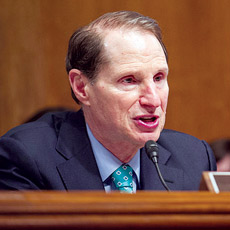
Nursing homes were woefully unprepared for natural disasters last year, and the ranking member of the Senate Committee on Finance called for more oversight in a report issued Friday.
Sen. Ron Wyden (D-OR) said hurricanes Harvey and Irma caused problems that were not accidents, including the deaths of 12 seniors at one facility. He called them “preventable tragedies that resulted from inadequate regulation and oversight, ineffective planning and communications protocols, and questionable decision-making by facility administrators.”
Wyden issued an 84-page report Friday focused on what went wrong in those two storms.
“My investigation found that in too many cases, nursing homes were ill-equipped to keep their residents comfortable and safe in the face of natural disasters, in some cases with fatal consequences,” he said in a statement. “This is a failure of responsible governing from top to bottom.”
The Democratic senator said that federal rules need to be “more robust and clear,” along with “dramatically” improving planning and communication between local and state officials, and nursing home leaders.
“Until changes are made, seniors in America’s nursing homes will continue to be at risk when disaster strikes,” he said.
In a lengthy statement issued over the weekend, LeadingAge President and CEO Katie Smith Sloan said the nursing home field shares senators’ concerns. She noted that the deaths of more than a dozen residents at a Hollywood Hills, FL, facility in 2017 “should never have happened.”
“We make no apology for poor quality nursing home care. Errors should be addressed. Continual improvement is a must,” she said.
However, she noted that substantial changes were put into place in late 2017, as part of new Centers for Medicare & Medicaid Services regulations, in response to concerns arising from hurricanes. Elected officials should wait for those new rules to take hold, along with speaking to nursing home leaders before enacting any further regulations.
“Room must be allowed for human judgment in emergency and disaster situations,” Smith Sloan said.
“Nobody entrusted with making the decision to evacuate or shelter in place takes it lightly. As we’ve seen, lives depend on leaders making the right decision — and learning from what happened before,” she said, later adding, “Let’s give the new system a chance to work.”
In a separate statement, American Health Care Association President and CEO Mark Parkinson noted that the “vast majority” of long-term care facilities have successfully implemented their emergency response plans. The industry’s focus is learning from best-in-class operators.
“Unfortunately, this report largely focuses on isolated incidents with tragic outcomes where existing regulations were ignored,” he said.
Parkinson added that nursing homes and assisted living facilities “must be a priority” for power restoration and supplies in emergency situations. And systems must be put in place so that providers can work more closely with authorities when deciding whether to evacuate or shelter in place.
The report — produced by minority staff of the Finance Committee — comes in response to hurricane-related deaths that followed Irma, along with incidents at Texas long-term care facilities after Harvey. It asserts that rules put in place by the Centers for Medicare & Medicaid Services are “wholly inadequate” when it comes to giving nursing homes direction in an emergency.
“Sheltering in Danger” offers 18 recommendations that officials can take to help providers be more prepared next time around. Those range from revising the safe and comfortable temperature standard, to highlighting the vulnerability of seniors in heat emergencies. A two-page summary of the report and its recommendations can be found here.




